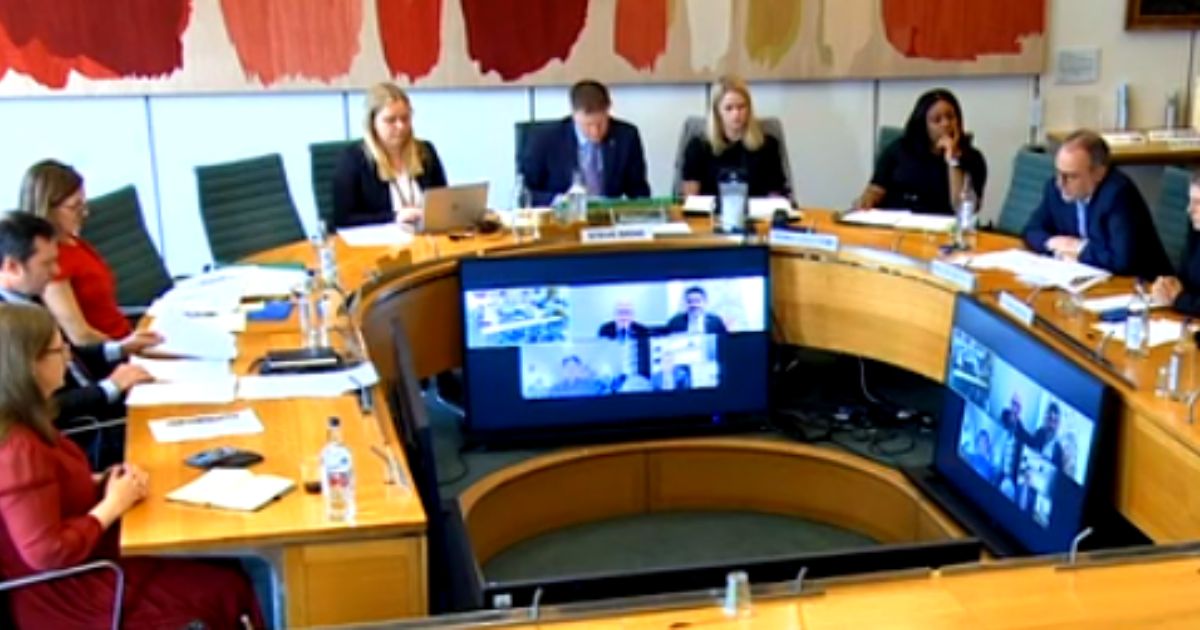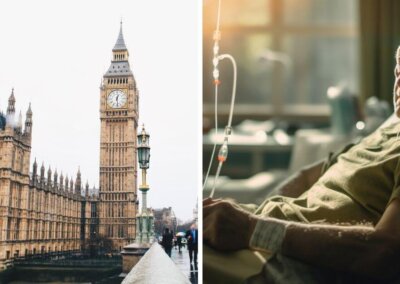The Health and Social Care Committee heard oral evidence from expert panellists on assisted suicide as part of an inquiry into assisted dying/assisted suicide.
Concerns were raised about the lack of balance among expert panellists during the last evidence session, with none of the three expert panellists who presented being opposed to assisted suicide.
A review of the past work of the panellists who were scheduled to present today suggests that three of these seven panellists are opposed to assisted suicide, although one scheduled panellist was unable to join the inquiry today.
This means that only three of the nine expert panellists who have presented to the committee are opposed to assisted suicide.
The committee initially heard from panellists in Australia and New Zealand, jurisdictions where the practice had been made legal.
Answering a question from Steve Brine MP, Professor Roderick MacLeod, former Senior Consultant and Senior Medical Specialist in Palliative Care, said that while public opinion polling seemed to suggest widespread support for assisted suicide and euthanasia, a more detailed understanding of the polls revealed a lack of understanding among the general public on what the practice entailed.
As in the UK, in New Zealand, it is lawful to turn off a machine that is keeping someone alive artificially when in consultation with a doctor and where it is deemed medically appropriate. Polling suggests, however, that this was not widely known and only 20% of voters in New Zealand’s euthanasia referendum knew that the referendum would not make it newly legal to turn off machines that are keeping people alive, as this was already legal.
Speaking on the referendum that made assisted dying legal in New Zealand, Professor MacLeod said “[Q]uite a significant number of the general public do not understand what euthanasia and assisted dying means. For example, a majority thought that switching off life support was a euthanistic act, discontinuing medical treatment was a euthanistic act. And so when people went to vote for the referendum, I think they weren’t entirely clear about what it was they were voting for”.
He went on to say that his concerns around the introduction of assisted suicide were grounded in his experience of over 30 years in palliative medicine. He also expressed his concern over the fact that only around six individuals of all those who had sought assisted dying were referred for a psychiatric opinion.
Only six of the 636 people assessed by a first medical practitioner or the 475 people assessed by a second medical practitioner for eligibility between 7 November 2021 and 6 November 2022 were referred to a psychiatrist, and each of these was confirmed as eligible, other than one person who died before the assessment was completed.
He also said that not enough attention was being paid to peripheral issues like loneliness, bereavement and financial difficulty that “can have a big impact on the way somebody feels as they approach the end of life”.
According to the latest report on Medical Assistance in Dying from Health Canada, 17.3% of people also cited “isolation or loneliness” as a reason for wanting to die. In 35.7% of cases, patients believed that they were a “burden on family, friends or caregivers”.
Answering a question from Chris Green MP on the potential widening of legislation to expand access to euthanasia, Professor MacLeod said that the Canadian example proved that this is the case.
“The Canadian legislation was held up by the MP who proposed the Bill in New Zealand as a model for us to copy and you can only look across to Canada now to see how things have changed there, that they are broadening the criteria significantly. They have broadened them in Belgium and in the Netherlands”.
The Federal Government in Canada passed legislation on Medical Assistance in Dying (MAiD) in June 2016. In March 2021, the Canadian Government amended the law to remove the requirement in the statute that death be “reasonably foreseeable” after it was successfully challenged (to allow for assisted suicide in cases of non-terminal illness) in the Superior Court of Québec. In 2022, proposals were brought forward to permit euthanasia and assisted dying on the grounds of mental illness. Similarly, the Netherlands is currently publishing guidelines to make child euthanasia for all ages legal.
“[A] very difficult time understanding how deliberately inducing death is the same as working toward the health and restoration of functions leading to human flourishing”
After listening to evidence from Australia and New Zealand, the committee heard evidence from physicians in the United States of America. Dr Lydia Dugdale, Director of the Center for Clinical Medical Ethics at Columbia University, said that she has “[a] very difficult time understanding how deliberately inducing death is the same as working toward the health and restoration of functions leading to human flourishing”. She went on to say that deliberately hastening or inducing death is not compatible with the classically-held views about the ends of medicine.
Dr Dugdale also echoed Professor MacLeod’s sentiments stating that “in every jurisdiction where either euthanasia or assisted dying has been legalised, it has expanded”. She also said that there have been several attempts to introduce euthanasia in the United States.
Pointing out that in some regions of Belgium, one in seven deaths are by euthanasia, she asked “What kind of society do we want to live in where we solve the problem of ageing and lack of access and poverty by euthanasia? And that’s what we are seeing happen in Canada that’s not had it legalised that long. People can’t pay their rent, they get euthanised. People can’t afford their medicines, they get euthanised. People need a wheelchair lift and the Veterans’ Affairs Office offers them euthanasia”.
Euthanasia is cheaper than medical care
The potential savings of assisted suicide and euthanasia have been highlighted by Canadian officials for a number of years. In 2017, the Canadian Medical Association Journal released a report that medical assistance in dying (MAiD) could reduce annual healthcare spending by between $34.7 and $136.8 million. In October 2020, the Office of the Parliamentary Budget Officer projected that the deaths from assisted suicide and euthanasia would save $86.9 million compared to the healthcare costs they would otherwise have needed to spend.
Euthanasia has been legal in Canada since 2016 for those who are terminally ill. In 2019, however, following the euthanising of Alan Nichols, a former school caretaker who was physically healthy but struggled with depression, the legal requirement that a person be terminally ill before the administration of euthanasia was dropped.
The Second Annual Report on Medical Assistance in Dying in Canada 2020 states that euthanasia and assisted suicide deaths account for 2.5% of all deaths in Canada.
In 2018, Roger Foley, a man with a chronic neurological disease, recorded hospital staff offering him assisted suicide despite him being clear that he wanted assistance to live at home and not end his life.
In 2020, an elderly woman in Canada was euthanised to avoid having to live through another COVID-19 lockdown.
Right To Life UK spokesperson Catherine Robinson said “Dr Dugdale and Professor MacLeod have clearly explained the dangers of introducing euthanasia and assisted suicide in the UK. There is widespread evidence that the introduction of such legislation almost always leads to widening criteria. This disproportionately affects vulnerable members of our society who deserve good care and not to have their lives ended”.











